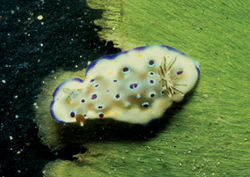Chromodoris tennentana
| Notice: | This page is derived from the original publication listed below, whose author(s) should always be credited. Further contributors may edit and improve the content of this page and, consequently, need to be credited as well (see page history). Any assessment of factual correctness requires a careful review of the original article as well as of subsequent contributions.
If you are uncertain whether your planned contribution is correct or not, we suggest that you use the associated discussion page instead of editing the page directly. This page should be cited as follows (rationale):
Citation formats to copy and paste
BibTeX: @article{Yonow2012ZooKeys197, RIS/ Endnote: TY - JOUR Wikipedia/ Citizendium: <ref name="Yonow2012ZooKeys197">{{Citation See also the citation download page at the journal. |
Familia: Chromodorididae
Genus: Chromodoris
Name
Chromodoris tennentana (Kelaart, 1859) – Wikispecies link – Pensoft Profile
- Doris tennentana Kelaart, 1858: 268 (Sri Lanka).
- Chromodoris vicina Eliot, 1904a: 392 (Zanzibar); Edmunds 1971[1]: 372, fig. 16, pl. 1A (Tanzania).
- non Chromodoris vicina. – Gosliner 1987[2]: 75, fig. 109 (South Africa) (= Chromodoris cavae Eliot).
- Chromodoris tennentana. – Rudman, 1987: 364, figs. 23, 32, 35, 36 (Tanzania); Yonow et al. 2002[3]: 855, fig. 13a (Chagos); Debelius and Kuiter 2007: 151 (South Africa); Richmond 2011[4]: 280 (East Africa).
Material
Seychelles: 8 × 5 mm pres. (PK–BB), Lilôt, NW Mahé, 17 m depth on algal-encrusted rock, 26 April 1992, leg. P Kemp (mantle glands obvious on preserved specimen). – Madagascar: photos of one juvenile, 10 mm in length, Nosy Bé, October 2007, J Hinterkircher.
Description
The Seychelles specimen has the typical colour pattern: a central patchy ochre-brown dorsum with ocellated violet spots, a creamy sub-marginal band with orange and purple spots, a blue-violet margin, and ochre rhinophores and gills. The specimen preserved in formaldehyde is translucent, with a rosy-orange and black gut. The flat translucent mantle skirt is extended, white mantle glands visible in a band along the edge: most are irregular in shape, some are stellate (Fig. 11A). Gills translucent, flat, and very simply pinnate; oral tentacles digitiform (Fig. 11B). The similarities and differences between this species and Chromodoris cavae, removed from synonymy of Chromodoris tennentana, are discussed under that species (see p. 36).
Taxon Treatment
- Yonow, N; 2012: Opisthobranchs from the western Indian Ocean, with descriptions of two new species and ten new records (Mollusca, Gastropoda) ZooKeys, 197: 1-130. doi
Other References
- ↑ Edmunds M (1971) Opisthobranchiate Mollusca from Tanzania (Suborder: Doridacea). (III). Journal Linnean Society (Zoology) 50: 339-396. doi: 10.1111/j.1096-3642.1971.tb00767.x
- ↑ Gosliner T (1987) Nudibranchs of Southern Africa. A guide to Opisthobranch molluscs of Southern Africa. EJ Brill, Leiden, Netherlands, 136 pp.
- ↑ Yonow N, Anderson R, Buttress S (2002) Opisthobranch molluscs from the Chagos Archipelago, Central Indian Ocean. Journal of Natural History 36: 831-882. doi: 10.1080/00222930110039161
- ↑ Richmond M (2011) A Field Guide to the Seashores of Eastern Africa and the Western Indian Ocean Islands, 3rd edition. Sida/SAREC-UDSM, Sweden, 464 pp.
Images
|

